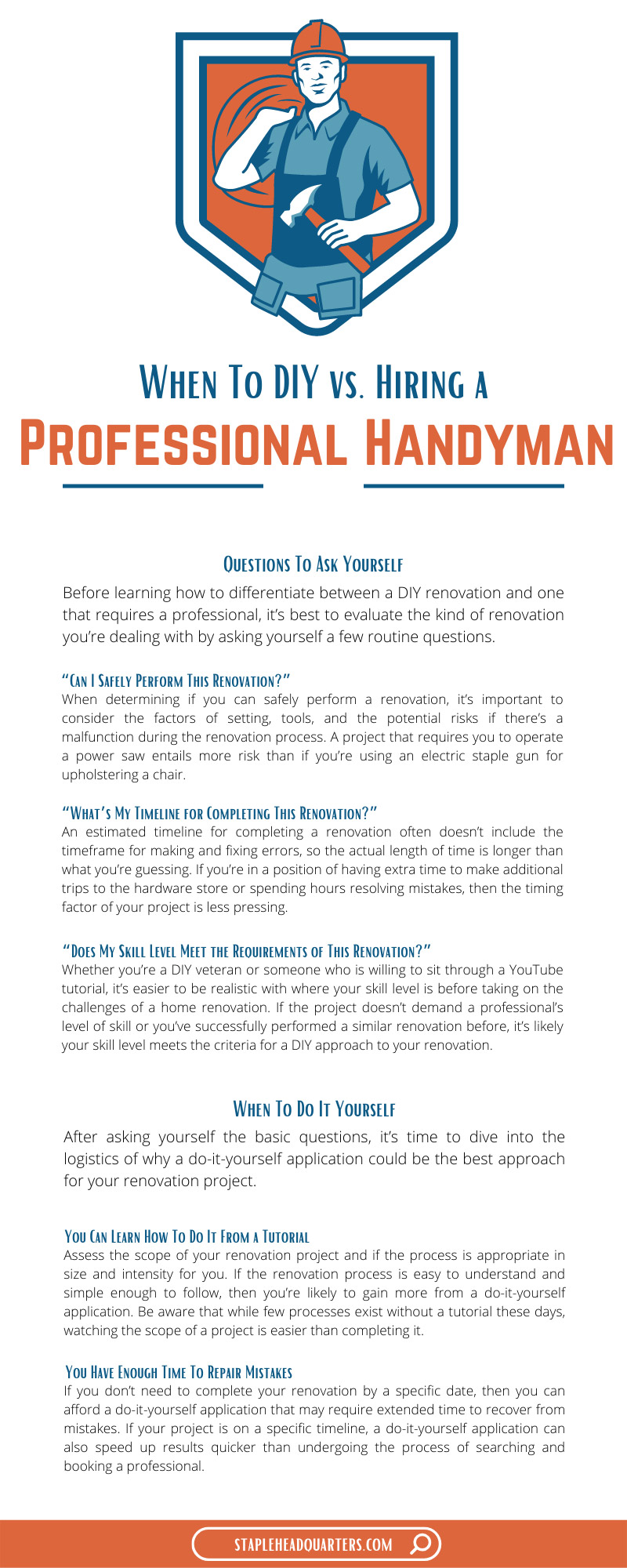
Hiring a professional handyman is likely your second choice if you’re a frugal homeowner who prefers to do their own handy work, but the reality is some renovations pose too many risks or require more than your set of skills can provide. If you’re in the middle of deciding between a self-taught project or phoning your local renovator, explore the following tips on when to DIY versus hiring a professional handyman.
Questions To Ask Yourself
Before learning how to differentiate between a DIY renovation and one that requires a professional, it’s best to evaluate the kind of renovation you’re dealing with by asking yourself a few routine questions.
“Can I Safely Perform This Renovation?”
When determining if you can safely perform a renovation, it’s important to consider the factors of setting, tools, and the potential risks if there’s a malfunction during the renovation process. A project that requires you to operate a power saw entails more risk than if you’re using an electric staple gun for upholstering a chair. Ask yourself if you have the necessary tools and practice to complete the renovation without compromising your safety.
“What’s My Timeline for Completing This Renovation?”
An estimated timeline for completing a renovation often doesn’t include the timeframe for making and fixing errors, so the actual length of time is longer than what you’re guessing. If you’re in a position of having extra time to make additional trips to the hardware store or spending hours resolving mistakes, then the timing factor of your project is less pressing. If you have a specific timeline in mind, then it’s important to ask yourself if a do-it-yourself application poses the risk of a longer process than hiring a professional handyman.
“Does My Skill Level Meet the Requirements of This Renovation?”
Whether you’re a DIY veteran or someone who is willing to sit through a YouTube tutorial, it’s easier to be realistic with where your skill level is before taking on the challenges of a home renovation. If the project doesn’t demand a professional’s level of skill or you’ve successfully performed a similar renovation before, it’s likely your skill level meets the criteria for a DIY approach to your renovation. Even if you’re confident in your skill level, it’s important to determine if you would prefer to hire a professional to guarantee the results you want.
When To Do It Yourself
After asking yourself the basic questions, it’s time to dive into the logistics of why a do-it-yourself application could be the best approach for your renovation project.
You Can Learn How To Do It From a Tutorial
Assess the scope of your renovation project and if the process is appropriate in size and intensity for you. If the renovation process is easy to understand and simple enough to follow, then you’re likely to gain more from a do-it-yourself application. Be aware that while few processes exist without a tutorial these days, watching the scope of a project is easier than completing it. Always take the time to be mindful of the learning curve in a renovation project and if it’s doable for your skill level and outcome expectations.
You Have Enough Time To Repair Mistakes
If you don’t need to complete your renovation by a specific date, then you can afford a do-it-yourself application that may require extended time to recover from mistakes. If your project is on a specific timeline, a do-it-yourself application can also speed up results quicker than undergoing the process of searching and booking a professional.
You Accept That the Outcome May Be Imperfect
The chances of imperfections are inevitably higher when you decide to forego the work of a professional. An important factor to look at is the type of expectations in place for your project. Whether this renovation is inside your home or if you’re performing it for someone else, decide if the potential for imperfect results is worth having over the cost of a pro’s work. If you’re not concerned about visible paint strokes or uneven drywall, then these minor imperfections won’t outweigh the economic benefits of a do-it-yourself application.
When To Hire a Professional
After considering the supporting reasons for a do-it-yourself application, your next move is to explore what factors of your renovation project indicate that a professional handyman is your best choice of approach.
When the Renovation Requires a Permit
It’s common for structural, electrical, and other major renovations to require a remodeling license in your local area. These types of renovations entail specialized tasks for a certified professional to perform, which is why it’s best to refrain from doing these projects yourself. The guidelines for permits vary between cities, so always consult your city government or local contractors to confirm what the regulations are.
When the Renovations Are for Selling Your Home
If you’re undergoing a renovation project to sell your home, it’s best to guarantee your home is in the best possible condition for optimal resale value. A situation where you’re showcasing your home to potential buyers isn’t ideal for a do-it-yourself application that can have amateur results. If buyers inspecting your home detect structural or functional issues, they’re likely to assume there are further issues that need repairing in your home. If the goal is to maximize the value of your home, the investment in a professional handyman’s service is likely worth the cost.
When the Renovation Could Be Fatal if You Make a Mistake
A non-negotiable reason to hire a professional is if the renovation process has the potential to be fatal if you make a mistake. If your renovations involve plumbing or electricity, you’re placing yourself at a higher risk of bodily injury and being exposed to hazardous materials. A qualified professional can navigate high-risk renovations and prevent amateur mistakes from happening in the first place. The level of risk will depend on the type of project you’re undertaking, but no amount of money is worth risking your well-being or life over.
As rewarding and cost-effective as DIY projects are, it’s important to evaluate if your next renovation is suitable for a do-it-yourself application. While the cost of a DIY renovation is cheaper in theory, the cost of a mistake can fall short of what you gain from a professional service. Next time you’re crossed about when to DIY versus hiring a professional handyman, revisit these questions and distinctions to maximize the results of your renovation with minimal cost to you.
